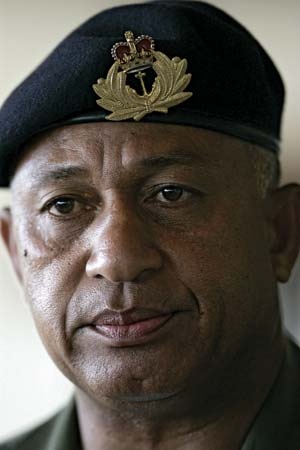Bainimarama, Voreqe
prime minister of Fiji
also called Frank Bainimarama
born April 27, 1954, Kiuva, Fiji
 Fijian military leader who led a 2006 coup that resulted in him becoming acting president (2006–07) and later acting prime minister (2007– ) of Fiji.
Fijian military leader who led a 2006 coup that resulted in him becoming acting president (2006–07) and later acting prime minister (2007– ) of Fiji.Although Bainimarama was a Methodist, he attended the Roman Catholic Marist Brothers High School in Suva, Fiji. From 1975 he pursued a career in the Fiji navy, rising to become commander (1988), captain (1994), and chief of staff (1998). On March 1, 1999, he was appointed commodore and commander of all of Fiji's military forces.
On May 19, 2000, a group led by disgruntled businessman George Speight overthrew the coalition government headed by Prime Minister Mahendra Chaudhry. Bainimarama persuaded then-president Ratu Sir Kamisese Mara to resign on May 29, 2000, and took over as head of an interim military government in what many considered a countercoup. The Muanikau Accord, signed by Bainimarama (as head of government) and Speight, led to the release of the insurgents' hostages (including Chaudhry) on July 13. A few days later Bainimarama returned power to an interim government led by newly appointed Prime Minister Laisenia Qarase and Pres. Ratu Josefa Iloilovatu Uluivuda.
Following elections in 2001 and again in May 2006, Qarase was returned to power, but the dissension between him and Bainimarama continued, particularly with regard to what Bainimarama perceived as the prime minister's soft treatment of high-ranking chiefs and politicians who had been convicted for their roles in the 2000 coup. The government tried to oust Bainimarama while he was overseas visiting troops in October 2006, but the government's alternative commander declined to take over, and senior officers rallied behind their commander. On his return to Fiji, Bainimarama purged the army of senior officers whom he considered disloyal and increased pressure on Qarase's government. In November 2006 Bainimarama demanded the withdrawal of two bills, one of which included the power to grant amnesty to coup leaders; he also demanded the dismissal of the police commissioner, Australian Andrew Hughes. Qarase said that the bills would be put on hold and Hughes's appointment would be reviewed. Unimpressed, Bainimarama's troops effectively took over the reins of power on Dec. 5, 2006. Bainimarama had the parliament dissolved, and he deposed Uluivuda to become acting president.
While his supporters claimed that the military takeover was necessary in light of Qarase's corrupt actions, others believed that Bainimarama undertook the coup to avoid prosecution over his alleged mismanagement of military funds, which was then the subject of a government investigation. On Jan. 5, 2007, Bainimarama declared himself acting prime minister and reinstated Uluivuda as president; he also promised to hold democratic elections in 2010. In April 2007 he dissolved the Great Council of Chiefs—an administrative body of traditional chiefs with the power to appoint Fiji's president and vice president—after it refused to accept his choice for vice president. In February 2008 Bainimarama reinstated the council and appointed himself chairman.
- John Wooden
- John Wood Oman
- John Wood, the Elder
- John Wood, the Younger
- John Woolman
- John Wyatt
- John Wycliffe
- John Wyndham
- John W. Young
- John X
- John XI
- John XI Becchus
- John XII
- John XIII
- John XIV
- John XIX
- John X. Merriman
- John (XVI)
- John (XVII)
- John XVIII (or XIX)
- John XV (or XVI)
- John (XX)
- John XXI
- John XXII
- John (XXIII)